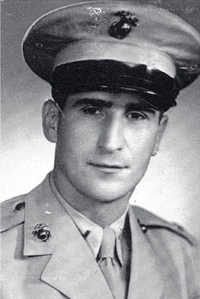James P. Scondras Memorial Gymnasium, Rogers School
Places gather meaning from the names we give to them. It’s a basic human impulse to give a name to a place. The original gestures pass into history and are sometimes overlooked as we live day to day. People who are new to a place may not know the source of the names on local streets, buildings, and monuments. Sometimes names change: Lowell replaced East Chelmsford, which replaced Wamesit. Across Lowell, there are tributes to notable persons from the community in the form of signs, plaques, building names, and more. On Highland Street at the Edith Nourse Rogers School, now the home of the administrative offices of the Lowell School Department, the ever-busy gymnasium is named for James P. Scondras (1920 – 1945). He was a star athlete at Lowell High School and Holy Cross College who died in battle on the island of Iwo Jima in February, 1945.
Here are three links to websites that tell more about this outstanding young man and US Marine: The Lowell High School Athletic Hall of Fame site, another called Baseball in Wartime, and the Spring 2011 issue of the online magazine of Holy Cross College in Worcester. The Holy Cross article by John W. Gearan is especially interesting for its telling of what happened on Iwo Jima:
Impossible to imagine, but true. Sgt. Tsaffaras, First Lt. Scondras ’43 and Cpl. Tsapatsaris grew up in The Acre, an immigrant-springboard neighborhood, then also known as Greektown. All graduated from Lowell High. Because he had high cheekbones and the daring of a Native American brave, his pals nicknamed Jimmy Scondras “The Chief.” They called Tsapatsaris “Red” because of his hair. Scondras ’43 signed on with the U.S. Marines Corps Reserves at Holy Cross. Tsaffaras joined the Marines in April 1942, Tsapatsaris, in November 1943.
Now they are together again, in a foxhole, in mortal danger. The reunion lasts only 20 minutes. “Jimmy (Tsaffaras) put together a quick meal for us from a can of scrambled eggs,” recalls Tsapatsaris.

A riveting story of inspiration and courage that brings many thoughts to mind. I remember playing ball with a couple of kids from the Scondras family in the AYO junior and pony leagues in the mid-sixtys. As a kid from the lower highlands, it was my first experience with the Greek kids of the Acre. Every one that I knew was intelligent, personable and humble with keen spirits of competetiveness. My connections with Greek kids carried over into High School (Keith Academy) where friendships grew with a couple of students from the Greek Acre. Reading this story about the character of Lt. Scondras is no surprise, but fascinating in his steady displays of courage at crunch time in both sports and major battles of war.
The story is also reminiscent of another Acre kid who took a different path and remained in Lowell to help kids learn a higher and more mature level of baseball then they were used to in junior league. That man was Bill Hodge. He was my manager during my first year playing ball at the North Common. He was a terrific teacher with an inate ability to relate to the kids. He was always polite, always confident in his delivery and treated each of his kids like a man. We were co-champions that year (1965).
Bill went to Viet Nam the next year, which was a crushing blow to the team. I remember being quite hurt when I learned he would not be back, but of course he was quite clear about a man embracing one’s duty, as difficult as this was for a 14 year old to understand and accept. He became a Sgt. and died in an ambush with his entire platoon. It was my first experience with attending a funeral for someone killed at war, and I can tell you it was a horrible feeling to know he was in that casket, and, that someone who held such promise in helping people find their potential had his life curtailed so suddenly and so young … and it still brings a tear.
Thank you for sharing this story.
Thank you for writing about this Paul. What a great man he was! We can not forget the sacrifices that have been made for us to live the lives we do today.